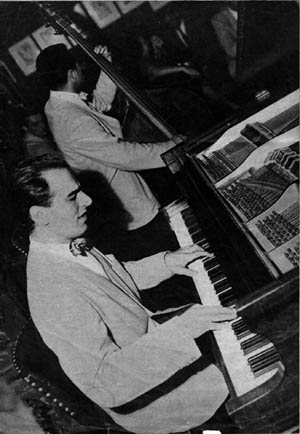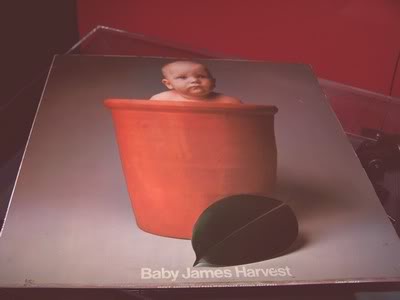| Author |
 Topic Search Topic Search  Topic Options Topic Options
|
MikeEnRegalia 
Special Collaborator


Honorary Collaborator
Joined: April 22 2005
Location: Sweden
Status: Offline
Points: 21758
|
 Posted: June 24 2008 at 08:21 Posted: June 24 2008 at 08:21 |
|
^ a nice idea ... I only see some difficulties on the "work together" part ... it will be hard to combine all the different approaches.
|
|
|
 |
M@X 
Forum & Site Admin Group


Co-founder, Admin & Webmaster
Joined: January 29 2004
Location: Canada
Status: Offline
Points: 4077
|
 Posted: June 24 2008 at 07:24 Posted: June 24 2008 at 07:24 |
|
Hey guys,
maybe you can work together to create the ULTIMATE PROG ROCK MUSIC DEFINITION to be used on the GUIDES TO PROG ROCK page http://www.progarchives.com/Progressive-rock.asp, to replace the WIKIPEDIA copy-paste from 2 years.
What I can do, once we have a final NEW version of the definition is to replace the one and ADD all the contributors direct and indirect and the bottom of the definition. It is fair ...
What do you think ?
Edited by M@X - June 24 2008 at 07:25
|
|
Prog On !
|
 |
Leningrad 
Forum Senior Member


Joined: August 15 2006
Location: Canada
Status: Offline
Points: 7991
|
 Posted: June 16 2008 at 03:06 Posted: June 16 2008 at 03:06 |
Well, I can give you a big ol' list of what prog isn't.
It's not a mammal. That should help narrow things down a little.  |
 |
Certif1ed 
Special Collaborator


Honorary Collaborator
Joined: April 08 2004
Location: England
Status: Offline
Points: 7559
|
 Posted: June 16 2008 at 03:03 Posted: June 16 2008 at 03:03 |
I'm frankly amazed at the insights and good points raised by the responses so far - I knew I'd missed stuff out and rather skimmed the details in my attempt to remain tightly focussed - but it all goes to show that you can be too tightly focussed... 
 Carl Snow wrote: Carl Snow wrote:
easy answer: 'progressive rock' = rock(etc) that progresses.
The Beach Boys 'Pet Sounds' , for example, pushed aside earlier notions of "pop"(whatever that is) by 'progressing' (moving past) the lines drawn around its, then current, conventions.
its really a matter of not being bound by oneself to color within the lines.
but thats just my 2cents
|
Trouble with this definition is that rock (and pop) music necessarily progresses over time. Compare what rock music sounded like in 1955 with what it sounded like in 1960, then compare that with 1965, 1970, 1975, 1980 and so on.
The underlying "progressiveness" of "Pet Sounds" (the use of common objects as instruments) is acually regressive - "Jug" bands had been doing exactly that for decades. The songs themselves are simply elaborate pop songs. It's the overall sound that was so striking, not the music.
On the final point, I'd say it's exactly the opposite - the more you confine yourself in music, the easier it is to have complete freedom. If you set no boundaries, you set no direction, having nothing to push against or aim at, and the music becomes a mire of uninspired noodle.
That's why Jazzers used to improvise around "standards", because the very act of locking yourself into a known tune gives instant structure to your improvs, and the limits you've set become boundaries to push against.
 The T wrote: The T wrote:
...we dare to call the metal that is listed here in PA, progressive-metal.
|
Obviously, you can call it whatever you like - but when you file it in the same bin as Progressive Rock, you have to expect comparisons.
 Atavachron wrote: Atavachron wrote:
what I'm increasingly impressed by is the era itself-- there was a time, though relatively brief, when the majority of English rock music was progressive.. perhaps not in comparison to Yes or Floyd, or what we would call Prog now, but the lion's share of British rock between about 69 and 73 (the 'post-underground' period) was elementally progressive if only because the musical standard and public expectations had increased. In fact it would appear that pop music itself had become progressive, and was expected to be if only to distinguish it as something different and worth hearing.
|
 darkshade wrote: darkshade wrote:
that makes you ask, what is jazz? what is classical music? what is considered avant-guard? one person might find certain music avant-guard, whereas someone else might find the same music accessible, and another person might even say it's not music.
it all comes down to... what is music??? or more specifically, what makes music good???
|
Music is sound organised in time.
I've got another article in the pipeline entitled "The Nature of Music", which might help with answers to both questions.
 kibble_alex wrote: kibble_alex wrote:
A very interesting article, however the bit about saying no prog has ever been done before... |
Hmm - didn't mean to imply that - I was rather hoping that the term "distinctly different" was sufficiently far away from "completely different".
 Carl Snow wrote: Carl Snow wrote:
* ' Recorded Jazz ceases to be "Jazz" upon its second spin '
|
Indeed - and that is the same with much Prog Rock - it becomes a vehicle in itself for improvisation. A recording is simply a snapshot.
Of course, it's not all like that - but take Gentle Giant, as a single example; The recording of "On Reflection" that appears on "Free Hand" is completely different to the version that appears on "Playin' the Fool" - the band improvise the various parts of what is already a fantastically complex song, adding new ideas, varying existing ones, until the old song is barely recognisable.
This is where the comparisons with jazz and real complexities come from - not the various modes or time signatures used. The music is a living, organic entity, not a museum exhibit.
Edited by Certif1ed - June 16 2008 at 04:06
|
|
The important thing is not to stop questioning.
|
 |
Carl Snow 
Forum Newbie

Joined: November 22 2006
Location: United States
Status: Offline
Points: 20
|
 Posted: June 15 2008 at 13:21 Posted: June 15 2008 at 13:21 |
 darkshade wrote: darkshade wrote:
that makes you ask, what is jazz?
|
that recalls a wonderful Eno-quote (paraphrasing) * ' Recorded Jazz ceases to be "Jazz" upon its second spin '
--- no derailing intended ; i just saw the type and remembered
( *meaning improvisation over structure/non--structure )
|
 |
ExittheLemming 
Forum Senior Member


Joined: October 19 2007
Location: Penal Colony
Status: Offline
Points: 11420
|
 Posted: June 15 2008 at 00:30 Posted: June 15 2008 at 00:30 |
|
Just wanted to congratulate Certif1ed for a very well researched and thorough initial post. I do agree broadly with most of his thoughts here but the only thing that might be missing (or may be considered irrelevant ?) is the strongly 'European/Asian' axis flavor of what we recognize instantly as 'prog' ?
(So what do you mean by European/Asian axis then you small irritating suicidal rodent ?)
Well, VERY broadly speaking, there is a noticeable 'thinning out' or conspicuous by its absence of the traditional blues vocabularly/scales/structures in a lot of 'prog' that does separate it from a lot of other rock music that is based very strongly on such devices. In other words, prog does not dispense with the blues entirely but perhaps looks more to the western/eastern classical traditions than it does the home of rock'n'roll (the USA) for its inspiration ?
Just my tuppenceworth....(old money)
|
 |
The Pessimist 
Prog Reviewer


Joined: June 13 2007
Location: United Kingdom
Status: Offline
Points: 3834
|
 Posted: June 14 2008 at 18:12 Posted: June 14 2008 at 18:12 |
A very interesting article, however the bit about saying no prog has ever been done before... does that make every pioneering music progressive? If so, then classical, jazz, bangra... these are all forms of prog. My definition is simply this: Prog Rock : Intricate and intelligent music with the hard edge of "rock". I think that pretty much describes every bit of prog you can think of. If the one you are thinking of doesn't fit that description, ask yourself whether it really belongs in the "prog" criteria, and not somewhere else e.g. classical, avante-garde. Otherwise, i agree with most things in your article. Well written as well 
|
|
"Market value is irrelevant to intrinsic value."
Arnold Schoenberg
|
 |
Easy Money 
Special Collaborator


Honorary Collaborator / Retired Admin
Joined: August 11 2007
Location: Memphis
Status: Offline
Points: 10732
|
 Posted: June 14 2008 at 15:09 Posted: June 14 2008 at 15:09 |
 Atavachron wrote: Atavachron wrote:
what I'm increasingly impressed by is the era itself--† there was a time, though relatively brief, when the majority of English rock music was progressive.. perhaps not in comparison to Yes or Floyd, or what we would call Prog now, but the lion's share of British rock between about 69 and 73 (the 'post-underground' period) was elementally progressive if only because the musical standard and public expectations had increased.† In fact it would appear that pop music itself had become progressive, and was expected to be if only to distinguish it as something different and worth hearing.
|
In the early 70s radio stations that played long songs and album sides were called "progressive rock" radio stations. This included bands like Humble Pie, John Mayall etc. It was not until later that the word progressive was applied mostly to bands like Yes KC etc.
Edited by Easy Money - June 15 2008 at 03:46
|
 |
darkshade 
Collaborator


Honorary Collaborator
Joined: November 19 2005
Location: New Jersey
Status: Offline
Points: 10964
|
 Posted: June 14 2008 at 15:04 Posted: June 14 2008 at 15:04 |
|
that makes you ask, what is jazz? what is classical music? what is considered avant-guard? one person might find certain music avant-guard, whereas someone else might find the same music accessible, and another person might even say it's not music.
it all comes down to... what is music??? or more specifically, what makes music good???
|
|
|
 |
Easy Money 
Special Collaborator


Honorary Collaborator / Retired Admin
Joined: August 11 2007
Location: Memphis
Status: Offline
Points: 10732
|
 Posted: June 14 2008 at 14:50 Posted: June 14 2008 at 14:50 |
 Carl Snow wrote: Carl Snow wrote:
easy answer: 'progressive rock' = rock(etc) that progresses.The Beach Boys 'Pet Sounds' , for example, pushed aside earlier notions of "pop"(whatever that is) by 'progressing' (moving past) the lines drawn around its, then current,† conventions. its really a matter of not being bound by oneself to color within the lines. but thats just my 2cents
|
progressive rock = rock that progresses
Thanks Carl, that is the only way progressive rock will ever be taken seriously by other musicologists.
To that I would add that it should be music that progresses rock a lot ie King Crimson, not U2.
Secret code words, such as "prog" as a word that does not mean the same as progressive, will always seem silly to those who are coming from outside the progressive genre.
I am not referring to the initial blog which uses prog as an abreviation for progressive, as opposed to using it as an entirely different word.
Edited by Easy Money - June 16 2008 at 07:54
|
 |
PROGMONSTER2008 
Forum Senior Member

Joined: December 09 2007
Status: Offline
Points: 610
|
 Posted: June 13 2008 at 21:25 Posted: June 13 2008 at 21:25 |
|
prog is jazz/classical rock. Clever rock music from the 70s which form clever/catchy melodies which never seem to get boring. I'm yet to hear a great band to form after 1980. Forget about the term 'progressive'. No need to invent new music styles or break boundaries. A clever song is a clever song. If you can write a great melody using your great ideas(people who don't rate hard rock and metal are on the right track). As long as you have interesting bass lines or bass playing, catchy classical keyboard, jazzy drumming, nice wind instruments, lots of hammond, rhodes, piano, harpsichord etc. Then you are on the right track :)
Edited by PROGMONSTER2008 - June 13 2008 at 21:34
|
 |
MikeEnRegalia 
Special Collaborator


Honorary Collaborator
Joined: April 22 2005
Location: Sweden
Status: Offline
Points: 21758
|
 Posted: June 13 2008 at 16:20 Posted: June 13 2008 at 16:20 |
|
|
|
|
 |
Atavachron 
Special Collaborator


Honorary Collaborator
Joined: September 30 2006
Location: Pearland
Status: Offline
Points: 65776
|
 Posted: June 13 2008 at 16:09 Posted: June 13 2008 at 16:09 |
|
what I'm increasingly impressed by is the era itself-- there was a time, though relatively brief, when the majority of English rock music was progressive.. perhaps not in comparison to Yes or Floyd, or what we would call Prog now, but the lion's share of British rock between about 69 and 73 (the 'post-underground' period) was elementally progressive if only because the musical standard and public expectations had increased. In fact it would appear that pop music itself had become progressive, and was expected to be if only to distinguish it as something different and worth hearing.
|
 |
The T 
Special Collaborator


Honorary Collaborator
Joined: October 16 2006
Location: FL, USA
Status: Offline
Points: 17493
|
 Posted: June 13 2008 at 14:24 Posted: June 13 2008 at 14:24 |
Just let me see if our much maligned genre would fit this definition, which I will take as valid just for the purposes of my response (it's very very likely that this is a valid definition)
 Certif1ed wrote: Certif1ed wrote:
Progressive Rock is a form of Rock music with an artistic intention, that is both composed and improvised, takes its influences from a wide variety of sources, and fuses these approaches together to create music that is distinctly unlike anything that has preceeded it.
|
Now, for the riff-raff noisy genre:
A form of rock music - Definitely what we dare to call progressive-metal is a form of metal; metal, in the end, is a form of rock music pretty much stripped of some elements of the original thing but still part of it. Hence prog-metal fits this part of the definition though not 100%.
With an artistic intention - Well, it fits. Maybe some people won't think of it as high art or anything (many people wouldn't consider even prog-rock as high art anyway) but the INTENTION is artistic. It's obvious that commercial gain is not really the intention in most prog-metal bands as the genre has proved to be a complete disaster to generate wealth and sales. No MTV exposure and no awards and no fame, I think it has a different intention. MAybe it's not artistic, maybe it's a psychological effort to boost egos by means of showing off, but as they have opted to use an art form to do that, let's agree they do it with an artistic intention. There's no question, though, that what we dare to call "prog metal" has a much more evident artistic intention that commercial metal bands. Hence we daring to call it "prog metal" as it tries to distance itself for commercial friendly metal.
Both composed and Improvised - We can't say much about the "composed" part. Now, about the "improvised" part, this may be a difficult point to prove. In general, prog-metal bands have certain "improvisation" (call them jamming) moments in live performances or even in record (Liquid Tension) but that distinct flavor that the person who wrote this definition asks for maybe it's missing: the fact that prog should sound at the same time composed but improvised, free. Prog-metal tends to be tightly composed around riffs and structures (many times irregular structures, but rigid structures nevertheless). It's difficult to sense that feeling of "improvisation" that one feels with old-70's prog bands. It CAN be found from time to time. So I'd say this element fits in prg-metal only 40% or so. BUT, it can be found a lot more in what we dare to call "prog-metal" than in traditional commercial metal. Hence we daring to call it "prog-metal" as it clearly tries to distance itself from simpler, radio-friendly metal. (by the way, even though metal is not the radio-friendliest of genres, it has a lot of exposure in metal radios. But usually prog-metal is not part of the broadcast).
Takes influences from a variety of sources - well, prog-metal biggest influence is off course metal, in many of its forms (death, thrash, etc). But in prog metal you'll find elements of other genres (jazz, classical, even flamenco). Though maybe those influences at times may sound gimmicky, at times they're fully integrated in the music. Prog-metal fits this part of the definition. And its influences are much more varied than those of traditional commercial metal. Hence we daring to call it "prog metal" as it clearly tries to distance itself from radio-friendly metal.
Fuses approaches to create something distinctly unlike anything that has preceeded it - Prog-metal fuses its influences and the elements of this definition (even if some don't fit 100%) to create music; we got that part right. Now the "unlike anything that has preceded it". That may be more difficult with hundred of derivative bands that exist. The same, though, can be said of retro-symphonic-prog or neo-prog bands that don't really sound unlike anything that preceeded them. As always, as with any genre, there are bands that sound original and some that follow them. It can be said that even those original bands (let's say, DIABLO SWING ORCHESTRA) are still using the same riffs and progressions and structures that have been used before, even if they sound unique. Well, music exists since... the old 70's bands were also using elements of classical music that they didn't invent, elements of jazz they didn't create... Yes, their forms were freer, therefore they sounded fresh. It still borrowed from somewhere. Prog-Metal borrows not so much from prog-rock but from METAL. As it if were a different thing that music. What is clear is that in the bands that we dare to call "prog metal" there's a much more distinct approach at trying to re-invent the genre than in commercial metal bands (even if sometimes they may end sounding like clones... just like neo prog bands)... Hence we daring to call it "prog-metal".
I will say that maybe progressive-metal is not really a b*****d child of prog-rock but just a cocky, pretensious nerdy son of METAL. Maybe it wouldn't be out of place to, actually, delete all metal bands from PA as they clearly don't belong in the same genre as King Crimson or the others. Maybe, after all, progressive-metal just belongs in a METAL website as a subgenre called, well, "progressive-metal".
Just three points:
- Even if it's by means of extended solos, virtuosism (call it shredding, whatever you want), odd time signatures, and other minor elements, progressive metal tries to be "more" than traditional commercial friendly metal. And as a subgenre of rock (metal it is), we may dare to call it "progressive" metal.
- The elements I just used come from ONE definition of progressive rock, that one found in the original post in this thread. As it hasn't been proved to be the ultimate definition (how will we prove it anyway), prog-metal may still find its way in another one. This is ONE definition coming from one person.
- In the big scheme of things, this is really not important at all. But in the genreal consensus of what is and what isn't "progressive", what we dare to call "progressive metal" has been generally absoved and accepted as part of the big "progressive rock" umbrella. Therefore, and we'll have to be excused for this, we dare to call the metal that is listed here in PA, progressive-metal.
Edited by The T - June 13 2008 at 15:11
|
|
|
 |
Hawkwise 
Forum Senior Member


Joined: May 31 2008
Location: Ontairo
Status: Offline
Points: 4119
|
 Posted: June 13 2008 at 14:16 Posted: June 13 2008 at 14:16 |
 MikeEnRegalia wrote: MikeEnRegalia wrote:
^ Problem is: This album is usually not called "Prog". Neither is Queen II, which is also quite daring and adventurous.
|
daring and adventurous 
|
|
|
 |
MikeEnRegalia 
Special Collaborator


Honorary Collaborator
Joined: April 22 2005
Location: Sweden
Status: Offline
Points: 21758
|
 Posted: June 13 2008 at 13:56 Posted: June 13 2008 at 13:56 |
|
^ Problem is: This album is usually not called "Prog". Neither is Queen II, which is also quite daring and adventurous.
|
|
|
 |
Carl Snow 
Forum Newbie

Joined: November 22 2006
Location: United States
Status: Offline
Points: 20
|
 Posted: June 13 2008 at 13:48 Posted: June 13 2008 at 13:48 |
|
easy answer: 'progressive rock' = rock(etc) that progresses.
The Beach Boys 'Pet Sounds' , for example, pushed aside earlier notions of "pop"(whatever that is) by 'progressing' (moving past) the lines drawn around its, then current, conventions.
its really a matter of not being bound by oneself to color within the lines.
but thats just my 2cents
Edited by Carl Snow - June 13 2008 at 13:50
|
 |
Slartibartfast 
Collaborator


Honorary Collaborator / In Memoriam
Joined: April 29 2006
Location: Atlantais
Status: Offline
Points: 29630
|
 Posted: June 13 2008 at 10:54 Posted: June 13 2008 at 10:54 |
Prog is a pretty flower that smells bad. 
|
Released date are often when it it impacted you but recorded dates are when it really happened... 
|
 |
burtonrulez 
Forum Groupie


Joined: September 13 2007
Location: United Kingdom
Status: Offline
Points: 51
|
 Posted: June 13 2008 at 09:55 Posted: June 13 2008 at 09:55 |
|
What amazes me is that people often think that prog is the only genre that is hard to define as such. I can assure you that I have had equally in depth discussion as to what heavy metal really is.
|
 |
korni 
Forum Newbie

Joined: June 13 2008
Status: Offline
Points: 1
|
 Posted: June 13 2008 at 09:47 Posted: June 13 2008 at 09:47 |
Hello friend,
I' ve read your essay with much interest and pleasure. It's a relief to know that there are others too who spend their sleepless nights trying to ponder the nature of the mysterious, fluid and multiform phenomenon called "progressive rock".
For me, "progressive rock" is rock's attempt to be a serious music of its time. When rock wants to be serious, or to be taken seriously, when it abandons any ambition to be immediately entertaining, when it is transformed into forms whereby its protagonists can fully express their esthetic or social ideas (no matter how personal, unusual or unpopular they might be), then it goes prog. A serious music of its time (distinguished from other, non-rock attempts to produce modern serious music, such as jazz, modern orchestral music, modern electronic music, various auteur forms...).
Thus, definitely, prog is not pop. Prog is art, or attempts to be art, and I definitely agree with you on that point.
Aside from this spiritual definition one can, and this has predominantly been done, offer a structural definition of prog: tendency to produce long pieces; compositional, rhythmic or instrumental complexity; primacy of music over discourse; love of theatrical elements, frequent use of keyboard instruments, proneness to concept albums, and so on and so on.
However, I think that these structural elements are frequent but not essential. One can easily find prog pieces shorter than 5 minutes, not complicated, with much singing or recitation, sober or detached (rather than theatrical), not keyboard-dominated and not included within a concept album format. Yet, I admit that the afore-mentioned structural elements are indeed very frequent.
Thus, to conclude and to concede to the structuralists, letís say that ď"progressive rock" is rock's attempt to be a serious music of its time, frequently characterized by long compositions, structural complexity and theatrical elements.
This is just a working definition, of course.
Cheers!
Boris Radovic, Belgrade, Serbia
|
 |
/PAlogo_v2.gif)
/PAlogo_v2.gif)


